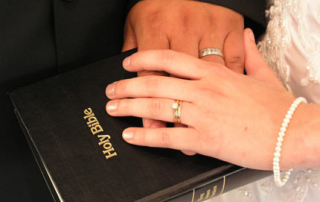The headship of the husband (1 Cor 11:3) signifies a large responsibility, a special care, as a provider, arranger, protector, guide, and example to his wife and children. If all men might properly see their duties, responsibilities and privileges in this divine arrangement, it would surely be a benefit to themselves as well as to those under their care. The woman too, who reverences her husband honors herself and provides a noble example to her children as to what constitutes a good mother and wife (Prov 22:6).
This reverence for the husband does not imply that the wife should not exercise her judgment and bring to her husband's attention trials or difficulties or burdens too heavy for her. Her presentation of her views, hopes and desires should not be in a mandatory manner, but one which would recognize the headship of her husband. If the wife has better judgment in respect to the guidance of the home, in respect to the spending of money, in respect to the training of the children etc., she is not therefore at liberty to assume the headship of the family and to order and direct her husband as though he were one of her children or a servant. Such a violation of the divine arrangement is sure to work disadvantage spiritually if not financially or in other matters, not only to the man, but also to the woman and the children.
One cause is mentioned in the Scriptures as a proper ground for the dissolution of the marriage bond (Matt. 19:3-10). The marriage contract is one that should stand until death makes the separation, unless the one cause referred to releases the innocent from the guilty and faithless. The twain bound for life by mutual contract is thereafter no longer twain, but one flesh (Mark 10:7, 8). All their future happiness and prosperity in the present life depend upon their loyalty, generosity, love and consideration one for the other. Unfaithfulness to marriage vows would include on the husband's part a failure to provide, so far as possible, for his wife's necessities and would be desertion, even though he should desire to stay with her and have her support him (1 Tim 5:8). A wife so circumstanced may, if she choose, consider herself as literally deserted, and may refuse to entertain and support such a deserter. But desertion would not grant the right to either party to remarry so long as the other lives (1 Cor 7:10, 11). Of course in a case of the husband's sickness or inability to provide, the wife's duty according to the marriage covenant would be to spend herself to the last in his support. A true husband is a provider, and his care should include provision of spiritual as well as natural food and raiment for his wife and family.
The one point made clear respecting the duty of the believer is that he shall do his duty and seek in every honorable, proper manner to conserve the peace of the household and its general welfare, making as few points of contention as proper devotion to principle and conscience will permit. If there be real cause for separation, the believer must see to it that the cause is not in him. The Spirit of Christ in him is to make him gentler, more humble, more peaceable, more prudent, wiser, more long-suffering, more patient, more loving and more kind day by day.
Christian men and women are to remember the unselfish example of their great Redeemer. Selfishness lies at the bottom of every sin and in striving against sin they must of necessity strive against selfishness and endeavor to cultivate love.











